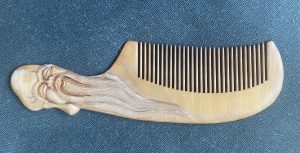
Beyond qi gong exercises, Chinese medicine recommends a number of simple and gentle, “health preservation exercises,” that if done consistently over time, can have a profound disease-preventive effect.
Some of the most common are self-massage, circles around our bellies to stimulate digestion, warming the lower back with our palms, or pressing circles with the pads of our fingers around the eyes to stimulate local blood circulation and avoid ophthalmological degeneration. Another one, which my baby finds most humorous to observe, is the “shaking of the bones,” where we stand with eyes closed and simply bounce up and down for 3-5 minutes to encourage circulation and induce a therapeutic vibration—only moderately compromised by a 9-month-old tugging on one pant leg.
My personal favorite is hair-combing. It is said from the end of winter until the beginning of summer our environment’s “yang” is rising. Outside of our bodies flowers and trees grow and bloom, and inside of us “qi” tends to elevate, both in the healthy form of boosts in mood and energy, but also potentially in the negative, manifesting as increased anxiety, anger, insomnia, hypertension and/or strokes: All forms of “pathological yang rising.”
Stimulating the scalp by using either our fingers or a fine comb is believed to engender a healthy yang rising, making it helpful for relieving fatigue, depression, or headaches. Superficially it is also great for stimulating hair follicles and combing out dandruff or dryness. Some orthodox practitioners believe we should comb or stroke only forwards in the morning and backwards in the evening (though I admittedly do only backwards in the morning because forward combing feels awkward and makes my “Jew-fro” look insane).
Conspicuous numbers for repetitions of any exercise in eastern traditions are 9, 36, and 100. What I personally find most pleasurable and manageable with hair combing is 9 strokes at each of the 4 longitudinal parts of the head (both sides, the vertex, and corners) for a total of 36/day. 100 is most advisable, but with the comb I find so many to eventually become painful.
The wood element in Chinese medicine belongs to the liver, which is largely in command of raising yang energy in the body. It is for this reason that if not the fingers we recommend using a wooden comb, as seen above, to match the elemental intention of the practice.
Although it seems rather odd in the west, where we tend more towards the “all or nothing” mentality of either high intensity training and marathon running or “couch-potato’ing,” these gentle practices of self-care can be the best prescription for long-term health preservation. Massaging our bellies and lower backs, shaking out the tension in our tendons and ligaments, and increasing local circulation all over our precious domes
As the weather warms and flowers bloom, I wish everyone a healthy yang rising for the months to come… and/or if you’re like me, and suspect you have “pathological yang” that could use some anchoring, please don’t hesitate to reach out for acupuncture or herbs.





